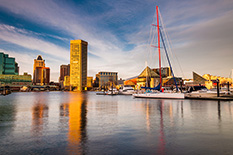New Report Gives Guidance on Growing Baltimore Medical Device Community
Attracting mid- to large-sized medical device companies through established innovation hubs is the biggest key to growing Baltimore into a major medical device technology sector, according to a report released today by the Maryland Technology Enterprise Institute (Mtech). “Baltimore already has many of the pieces in place to support innovation hubs and a thriving medical device community,” said Martha Connolly, director of Mtech Baltimore. “This study is important because we believe Baltimore is well-positioned to be a leading center for medical devices. The expertise of the University System of Maryland and Johns Hopkins University in engineering and medicine provide great capabilities for this sector.” The Mtech-commissioned report, “Encouraging the Development of the Medical Technology Cluster in the Greater Baltimore Region,” was conducted by the [Johns] Hopkins Graduate Student Consulting Club. The study involved extensive interviews with 20 CEOs of medical technology companies, economic development officials and investors in the Greater Baltimore Region. The study benchmarked Baltimore against successful medical device hubs and identified bottlenecks to growing a vibrant medical device cluster, including a lack of mid- to large-sized medical device companies in Baltimore, perceived lack of experienced, C-level management and follow-on funding after initial seed funding. “Capital and experienced labor are a ‘chicken-and-egg’ situation. You need one to produce the other,” said Connolly. “But we believe these bottlenecks are ‘critical mass’ issues that are remedied when a hub reaches a tipping point in terms of its size.” The report says that attaining that size, or critical mass of medical device companies, could be achieved through the following steps:
“Ideally, innovation centers are vertically integrated organizations and facilities that help startups by connecting them with the resources they need at different stages of development—from incubation, legal advice, clinical services, gap and follow-on funding to international soft landings,” said Sam Hong, the Johns Hopkins graduate student leading the study. “As private-public partnerships, these centers could also give larger companies access to economic development resources and startups in their industry. Those larger companies then support the innovation center members through capital and expertise.” The report cites innovation hubs as a critical missing piece to the puzzle. Innovation hubs connect startups to incoming companies while lowering the barriers to entering the region. Through innovation hubs, capital becomes more accessible as venture capital and funding from the innovation center flows to startups. Experienced C-level management talent also becomes available for advising startup company leaders. The report’s findings were discussed during Baltimore Innovation Week at an event sponsored by the Greater Baltimore Committee (GBC) titled “Building Baltimore’s Medical Device Industry.” “The Greater Baltimore region is fortunate to have a growing cluster of highly innovative medical technology companies fueled by an entrepreneurial environment,” said GBC President and CEO Donald Fry. “The GBC is proud to support them and is confident that this industry will eventually define the region as a medical device center.” More in-depth recommendations, along with benchmark metrics and additional findings are available in the report, available online at: http://mtech.umd.edu/Baltimore/docs/JHGCC_Med_Tech_Report.pdf. The study and report were compiled by Johns Hopkins graduate students Sam Hong, Katharina Schmidt, Joshua Wang, Hao Jia, Donna Cichani, Jing You and Belinda Peng.
About the Maryland Technology Enterprise Institute: www.mtech.umd.edu The mission of the Maryland Technology Enterprise Institute (Mtech), a unit of the A. James Clark School of Engineering at the University of Maryland, is to: educate the next generation of technology entrepreneurs; create successful technology ventures; and connect Maryland companies with university resources to help them succeed. Mtech has built a comprehensive entrepreneurship and innovation ecosystem at the University of Maryland. Its programs arm top students from around the world with the knowledge of how to successfully launch companies and guide aspiring and existing entrepreneurs through the entire lifecycle of launching and maintaining technology-based ventures. About the Hopkins Graduate Student Consulting Club http://jhgcc.weebly.com The Hopkins Graduate Student Consulting Club (JHGCC, previously known as the Johns Hopkins Business & Consulting Club*, or JHBCC) is a student-led organization that aims to introduce the Johns Hopkins students and staff to a career in management consulting by helping members: develop business knowledge and consulting skills through workshops, seminars, and bootcamps; network with experienced professionals and established firms via case competitions and infosessions; and build valuable experiences in leadership, teamwork, & communication through real-world engagements. About the Greater Baltimore Committee www.gbc.org For six decades, the Greater Baltimore Committee – the region’s premier organization of business and civic leaders – has been a leading voice for the business community on issues relating to economic growth, job creation, workforce development, transportation and quality of life. The GBC was organized on Jan. 5, 1955 as an action committee designed to mobilize the commercial, industrial and professional leadership of Baltimore to bring about tangible and rapid improvements in the community.
###
October 13, 2015 Prev Next |


